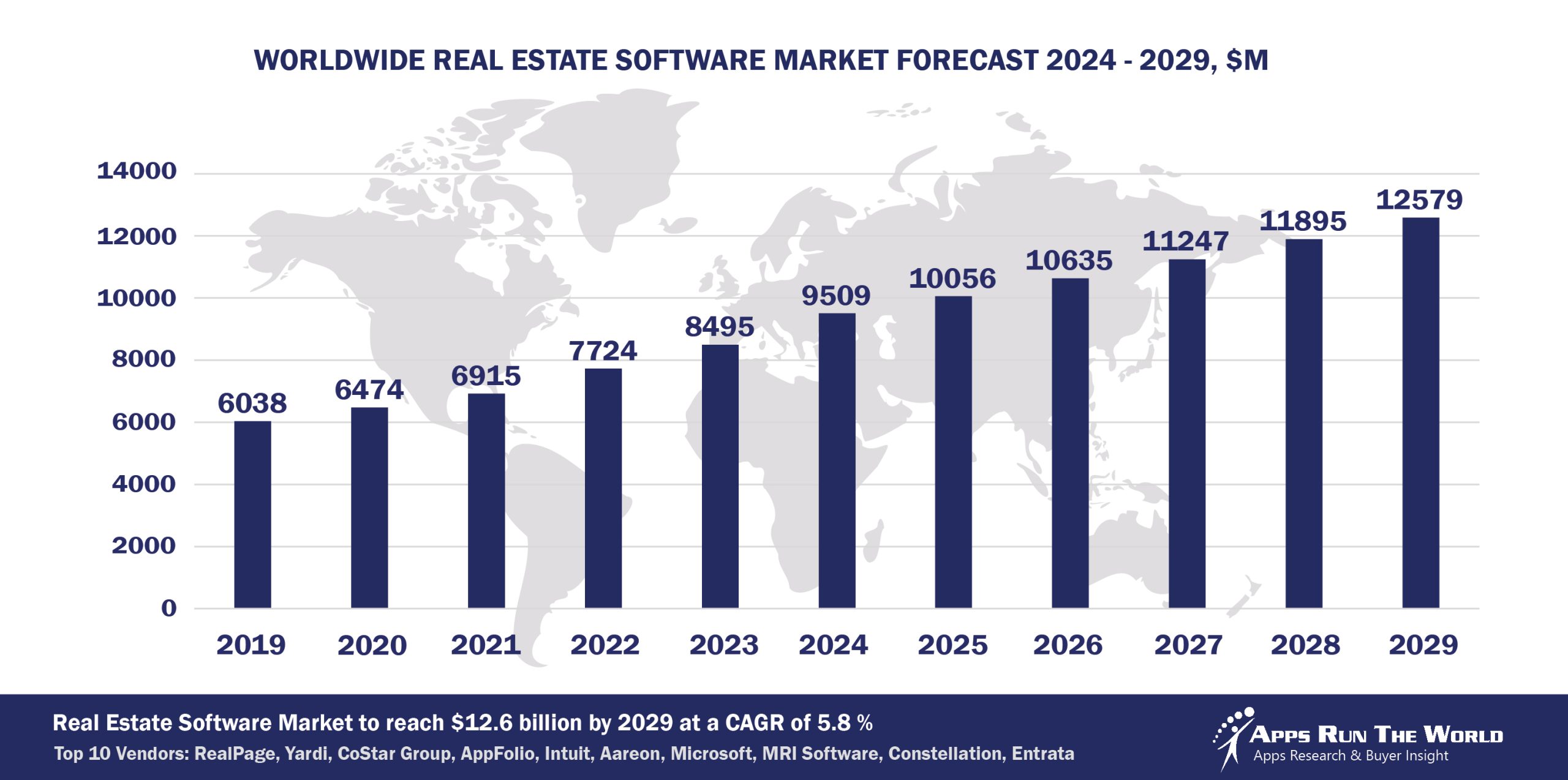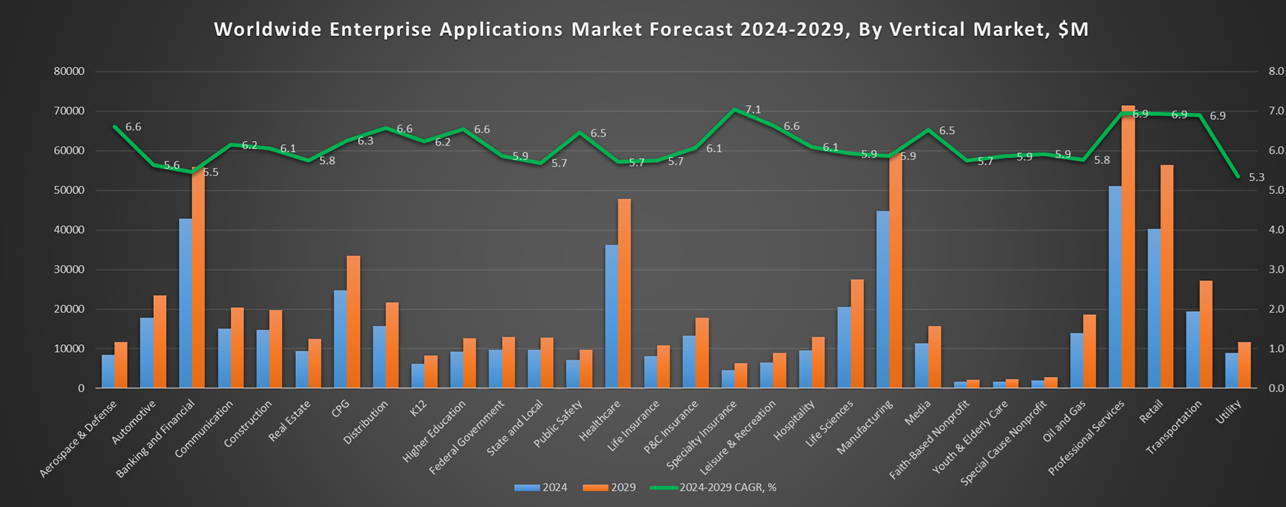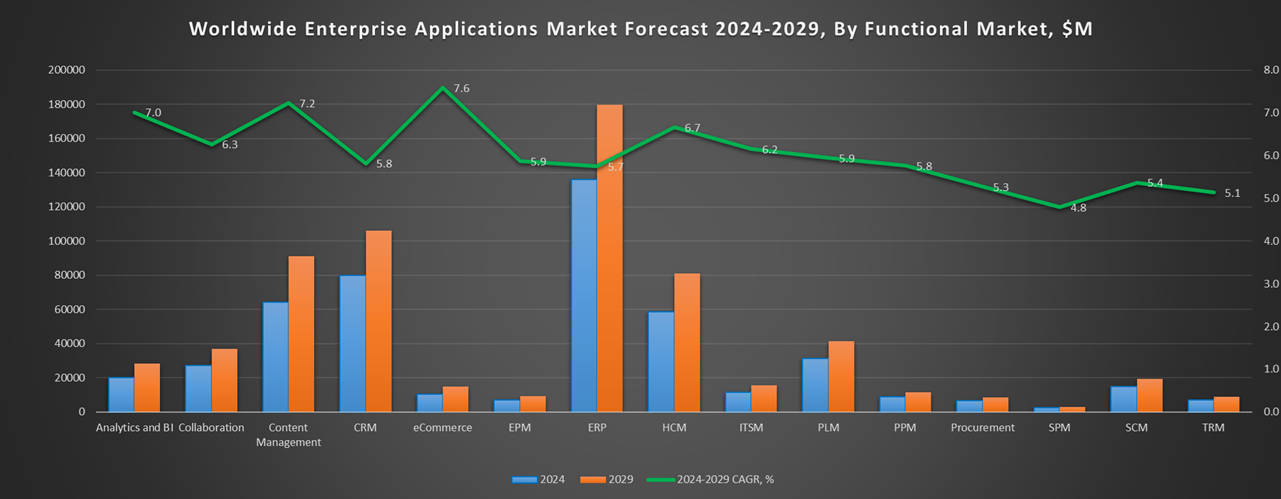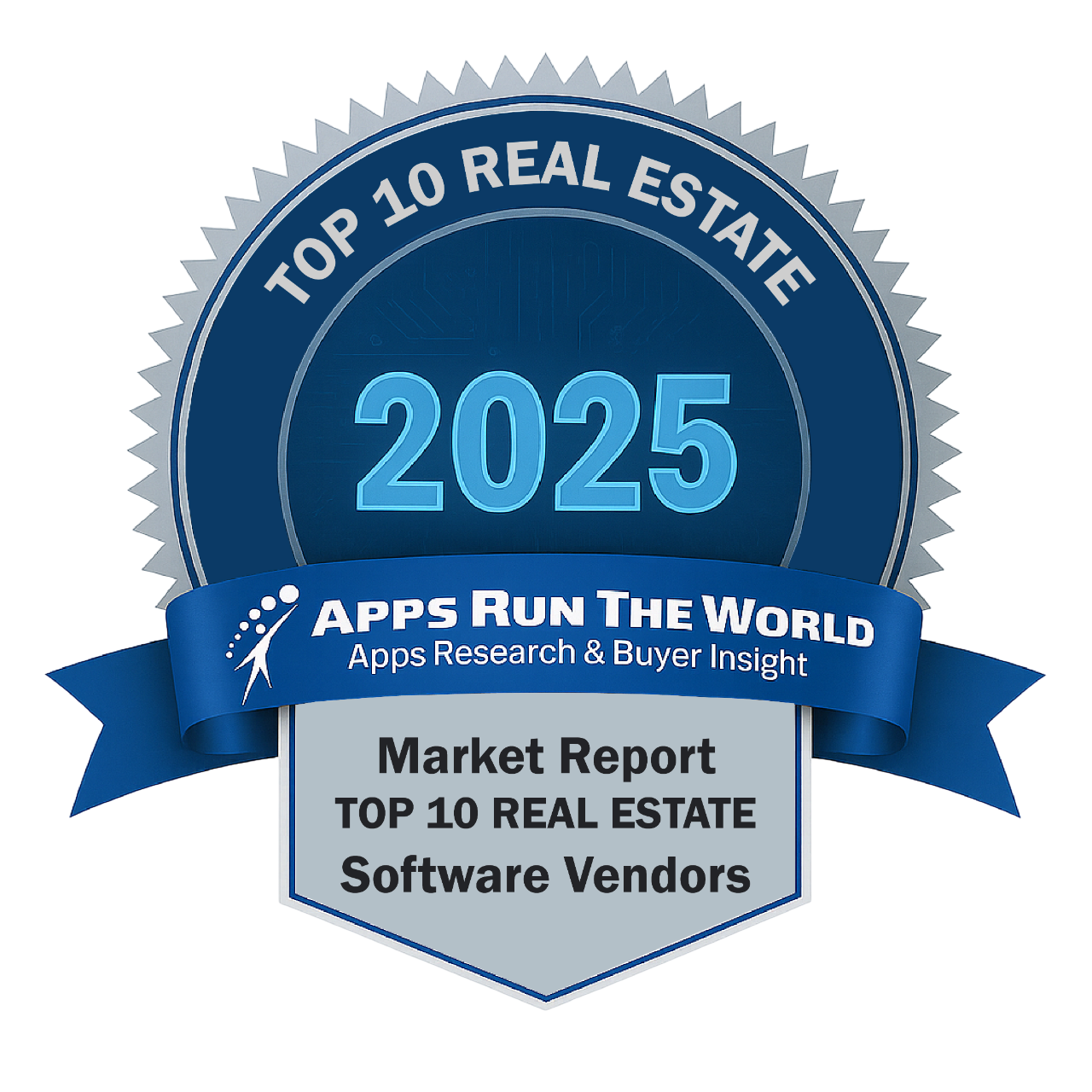
In 2024, the global Real Estate software market grew to $9.5 billion, marking an 11.9% year-over-year increase. The top 10 vendors accounted for 51.2% of the total market. RealPage led the pack with a 13.4% market share, followed by Yardi, CoStar Group, and AppFolio, Inc.
Through our forecast period, the Real Estate applications market size is expected to reach $12.6 billion by 2029, compared with $9.5 billion in 2024 at a CAGR of 5.8%, as shown in the Apps Top 500 Report – Excel Edition [Preview] .
Real Estate (Contracting and building of commercial, public, and residential structures, real estate management) – Bidding, cost estimates, Time Tracking, Homebuilder Software, Quantity Takeoff Software, Property Management, Financials, HR, Procurement
Top 10 Real Estate Software Vendors in 2024 and their Market Shares
Source: Apps Run The World, July 2025
Other Real Estate software providers included in the report are: Adobe, ADP, Arcoro, Atlassian, AVEVA Group, Buildertrend, Cisco Systems, Constellation Software Inc., Citrix, CoStar Group, Dropbox, DocuSign, Inc., ECi Software Solutions, Entrata, Eque2, eSUB Construction Software, FINALCAD, Foundation Software, Google, Global Payments Inc., HCSS, Hemlane, Hexagon, HubSpot, Hypoport SE, IBM, Infor, iLease Management LLC, Infor, JDM Technology Group, Lease Harbor, LeaseCalcs, Inc., Nemetschek Spacewell (ex MCS Solutions, ex Axxerion), Newforma, Nice Systems, Open Text Corporation, Oracle, Odessa Technologies, Paycom, PayProp, Pegasystems, PlanData Systems Corp, Procore, Property Matrix, Raken, RedTeam Software, Re-Leased Software Company Ltd, RemoteLandlord, Rent Manager by London Computer Systems, RIB Software SE, Rockwell Automation, Roper Technologies, Salesforce, SAP, ServiceNow, SS&C Technologies, SolarWinds, Sage, Sopra Steria Group SA, TenantCloud, Teradata Corporation, The Innovation Group, Twilio, Verint Systems Inc., Visma, VTS (ex Hightower), Workday, Yonyou, Zoom Video Communications, Zoho Corp., and others.
Vendor Snapshot: Real Estate Market Leaders
 RealPage
RealPage
RealPage continues to evolve its RealPage OneSite and Accounting platforms with AI-enabled revenue management and predictive analytics that help multifamily and commercial property owners optimize occupancy and asset performance. Recent enhancements include expanded automation in leasing workflows and real-time benchmarking tools. The company’s product roadmap centers on integrating smart building data, ESG tracking, and centralization tools to support enterprise-grade operational efficiency.
Yardi
Yardi is advancing its Voyager and Breeze platforms with generative AI features for automated leasing, maintenance, and communication workflows across residential and commercial portfolios. The company continues to invest in expanding its cloud-based ecosystem with vertical-specific modules, such as Yardi Elevate for asset performance and energy optimization. Strategic focus remains on unifying operational, financial, and compliance data within a single platform.
CoStar Group
CoStar Group expands its real estate management capabilities through CoStar Real Estate Manager by integrating advanced analytics for lease administration, space planning, and portfolio optimization. AI and automation initiatives are embedded in budgeting and forecasting tools to support corporate real estate and retail occupiers. The company continues to build on its data-driven approach through platform enhancements and acquisitions across marketplaces, analytics, and transaction services.
AppFolio, Inc.
AppFolio enhances its cloud-native Property Manager solution with new AI Leasing Assistants, smart maintenance workflows, and analytics dashboards tailored for SMB property owners. Its investments prioritize reducing friction in leasing, accounting, and resident engagement through automation and mobile-first experiences. AppFolio also continues to expand its ecosystem via API integrations with payments, insurance, and IoT partners.
Intuit Inc.
Intuit’s real estate relevance stems from its QuickBooks Online and Enterprise solutions used by property management firms for financials, payroll, and expense tracking. The company is embedding generative AI across its platform to automate bookkeeping, forecasting, and compliance functions. Through acquisitions like Mailchimp, Intuit continues to enhance marketing and communication tools for small business verticals, including real estate services.
Aareon
Aareon’s digital property solutions, including Aareon QL and Wodis Yuneo—are evolving with AI-powered tenant communication tools and predictive maintenance capabilities. Focused on the European housing sector, Aareon is expanding modular SaaS offerings to support smart building integration and energy management. Its strategic product investments align with digitalization mandates from housing associations and municipalities.
Microsoft
Microsoft’s Dynamics 365 and Microsoft 365 offerings are increasingly used by large property firms for finance, operations, and tenant relationship management. With a strong AI development pipeline, including Copilot integrations and Microsoft Fabric for unified analytics, the company enables advanced forecasting and cross-functional automation across the real estate value chain. Investments in partner-led industry solutions bolster relevance for commercial and corporate real estate.
MRI Software LLC
MRI Software is modernizing its MRI Platform X and Horizon suite with AI-powered forecasting, automated lease abstraction, and data intelligence capabilities tailored for mixed-use portfolios. Recent product updates emphasize open architecture, ESG tracking, and enhanced compliance features. The company continues to expand globally through acquisitions and regional partnerships to support complex real estate needs.
Constellation Software
Constellation Software, via Emphasys and Constellation1, delivers property management solutions primarily for affordable housing and MLS organizations. While its innovation model is decentralized, ongoing development includes compliance automation, CRM enhancements, and integrations with government housing systems. The company’s focus remains on scalable, niche-specific platforms across its portfolio of vertical software businesses.
Entrata
Entrata integrates AI-driven automation in leasing, accounting, and resident lifecycle management within its unified property management platform. Recent innovations include smart contract workflows and expanded data visualization capabilities. Entrata continues to scale its operations and R&D to serve enterprise and student housing operators with end-to-end functionality.
ARTW Technographics Platform: Real Estate customer wins
Since 2010, our research team has been studying the patterns of Real Estate software purchases, analyzing customer behavior and vendor performance through continuous win/loss analysis. Updated quarterly, the ARTW Technographics Platform provides deep insights into thousands of Real Estate customer wins and losses, helping users monitor competitive shifts, evaluate vendor momentum, and make informed go-to-market decisions.
List of Real Estate customers
Source: ARTW Buyer Insights Technographic Database
Custom data cuts related to the Real Estate Applications market are available:
- Top 900+ Real Estate Applications Vendors and Market Forecast 2024-2029
- 2024 Real Estate Applications Market By Functional Market (16 Markets)
- 2024 Real Estate Applications Market By Country (USA + 45 countries)
- 2024 Real Estate Applications Market By Region (Americas, EMEA, APAC)
- 2024 Real Estate Applications Market By Revenue Type (License, Services, Hardware, Support and Maintenance, Cloud)
- 2024 Real Estate Applications Market By Customer Size (revenue, employee count, asset)
- 2024 Real Estate Applications Market By Channel (Direct vs Indirect)
- 2024 Real Estate Applications Market By Product
Worldwide Enterprise Applications by Vertical Market
Exhibit 3 provides a forecast of the worldwide enterprise applications by vertical market from 2024 to 2029, highlighting market sizes, year-over-year growth, and compound annual growth rates across different industry sectors from Aerospace and Defense to Utilities.
Exhibit 3: Worldwide Enterprise Applications by Vertical Market Forecast 2024-2029 by Functional Market ($M)
Source: Apps Run The World, July 2025
Exhibit 4 shows our projections for the enterprise applications market by vertical segment, based on the buying preferences and the customer propensity to invest in new software within those industries as they continue to upgrade and replace many legacy industry-specific applications that have been identified and tracked in our Buyer Insight Database.


FAQ – APPS RUN THE WORLD Top 10 Real Estate Software Vendors, Market Size & Forecast
Q1. What is the global Real Estate software market size in 2024?
A: The global Real Estate software market reached $9.5 billion in 2024, growing 11.9% year‑over‑year.
Q2. Who are the top 10 Real Estate software vendors in 2024, and what share do they hold?
A: The top 10 vendors are RealPage, Yardi, CoStar Group, AppFolio, Intuit, Aareon, Microsoft, MRI Software, Constellation Software, and Entrata, together accounting for 51.2% of the Real Estate software market in 2024.
Q3. Which vendor leads the Real Estate software market in 2024?
A: RealPage leads the Real Estate software market in 2024 with a 13.4% market share.
Q4. What is the forecast for the Real Estate software market through 2029?
A: The market is expected to reach $12.6 billion by 2029, growing from $9.5 billion in 2024 at a 5.8% compound annual growth rate (CAGR).
Q5. What software functions are covered in the Real Estate market scope in this report?
A: It covers property management, financials, HR, procurement, homebuilder software, bidding, cost estimates, quantity takeoff, time tracking, and real estate management across residential, commercial, and public sectors.
Q6. What portion of the Real Estate software market do the top 10 vendors control in 2024?
A: The top 10 vendors control 51.2% of the Real Estate software market in 2024.
Q7. When was this Real Estate report published and by whom?
A: The Top 10 Real Estate Software Vendors, Market Size & Forecast 2024‑2029 report was published in July 2025 by APPS RUN THE WORLD analysts Albert Pang, Misho Markovski, and Marija Ristik, as part of the APPS TOP 500 research program, which benchmarks the revenues and market share of the world’s 1,500+ largest enterprise application vendors.
More Enterprise Applications Research Findings
Based on the latest annual survey of 10,000+ enterprise software vendors, Apps Run The World is releasing a number of dedicated reports, which profile the world’s 1,500 largest Enterprise Applications Vendors ranked by their 2024 product revenues. Their 2024 results are being broken down, sorted and ranked across 16 functional areas (from Analytics and BI to Treasury and Risk Management) and by 21 vertical industries (from Aerospace to Utility), as shown in our Taxonomy. Further breakdowns by subvertical, country, company size, etc. are available as custom data cuts per special request.
Research Methodology
Each year our global team of researchers conduct an annual survey of thousands of enterprise software vendors by contacting them directly on their latest quarterly and annual revenues by country, functional area, and vertical market.
We supplement their written responses with our own primary research to determine quarterly and yearly growth rates, In addition to customer wins to ascertain whether these are net new purchases or expansions of existing implementations.
Another dimension of our proactive research process is through continuous improvement of our customer database, which stores more than one million records on the enterprise software landscape of over 2 million organizations around the world.
The database provides customer insight and contextual information on what types of enterprise software systems and other relevant technologies are they running and their propensity to invest further with their current or new suppliers as part of their overall IT transformation projects to stay competitive, fend off threats from disruptive forces, or comply with internal mandates to improve overall enterprise efficiency.
The result is a combination of supply-side data and demand-generation customer insight that allows our clients to better position themselves in anticipation of the next wave that will reshape the enterprise software marketplace for years to come.
- Ergomed Group, a United States based Life Sciences organization with 500 Employees
- Areness India, a India based Professional Services company with 120 Employees
- 4 Creeks, a United States based Oil, Gas and Chemicals organization with 10 Employees
| Logo | Company | Industry | Employees | Revenue | Country | Evaluated |
|---|


 RealPage
RealPage